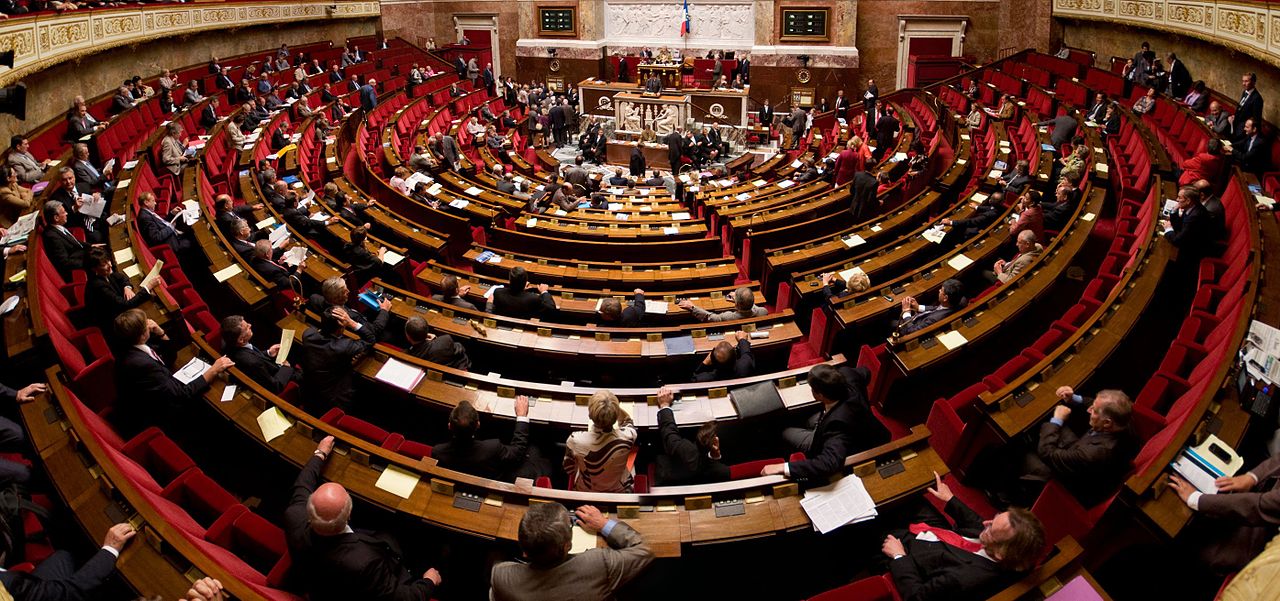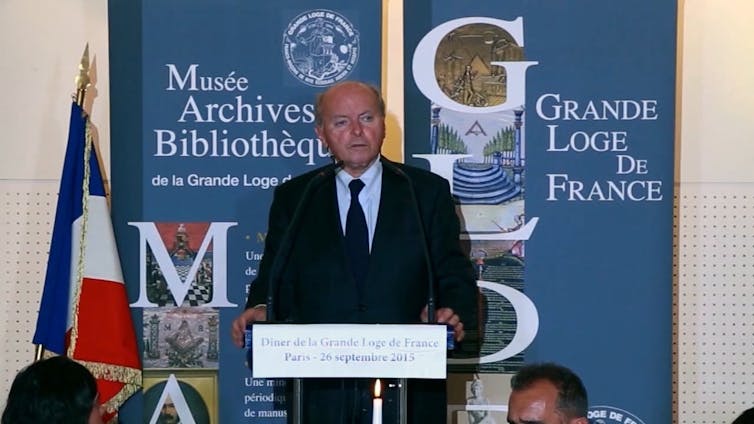For the creation of an Ombudsman
The new plan to combat radicalization should be announced in December. This announcement comes in a dual context: the constant shadow of jihadism and the announcement of the terrorist drift of radical right-wing militants.
Nicolas Lebourg, University of Montpellier
This innovation had the advantage of responding to the legal situation: in this area, the established penalties have long shown their limitations, as the same defendants have been able to commit repeat offenses, or even incorporate them into their communication strategy the prosecutions against themNevertheless, the mechanism chosen by the legislator was not without flaws due to the lack of harmonization with previous mechanisms, which could lead to serious democratic dysfunction.
A few days ago, the Constitutional Council censored this provision, considering that it represented an excessive restriction of freedom of expression—which led to strong protests from the International League Against Racism and Anti-Semitism (LICRA). However, there is a way out of this situation that respects freedoms and strengthens public order, recognizing that between censorship and license, there is the Republic.
The example of the Defender of Rights
The democratic problem caused by the July law has less to do with its principle than with its application. In particular, it should be noted that the Interministerial Delegation for the Fight against Racism, Anti-Semitism and Anti-LGBT Hatred (Dilcrah), a body attached to the Prime Minister, has taken to referring such cases to the courts on the basis ofArticle 40, paragraph 2, of the Code of Criminal Procedure. The risk is obvious: such referrals, with the text as it was voted, could have excluded convicted figures from political life. These proceedings would have been denounced ipso facto as an illiberal and illegitimate development in view of the separation of powers.
However, it turns out that not only can this problem be avoided, preserving the meaning of the will of Parliament and the Constitutional Council, but that this correction can be integrated into a mechanism that simplifies and rationalizes various provisions that have accumulated without harmonization in recent decades, while contributing to the renewal of control over radicalism. The aim is to create a Defender of the Republic, complementing the Defender of Rights established in 2011.

Christophe Amet — Kiki Factory/Wikimedia, CC BY-SA
The creation of the Defender of Rights has been unanimously welcomed. Not only has the new institution streamlined the various mechanisms it brings together, but it has also given rise to a figurehead for the defense of citizens' rights who now carries considerable weight in the public arena. This process should serve as a model for a new institution that would protect citizens' duties towards the Republic and the Republic itself from subversive activities, particularly with regard to incitement to hatred and discrimination based on gender, sexuality, religion, or ethnicity.
Opposing the Republic and subversion means both promoting constructive discourse that brings people together, defending social cohesion and secularism against competing identities, and building a concrete apparatus to respond to radicalism that contravenes the law. This can be done without restricting freedom of expression and by modernizing the state.
The existing legal framework for dealing with “subversion”
The "definitive regime of France," according to the wording of the constitutional law of 1884, is certainly deeply rooted in French society. However, this Republic has never been a simple open political market. Under French law, political parties are governed by the law of July 1, 1901, which stipulates that associations may not have "the aim of undermining the integrity of the national territory and the republican form of government."
Their role is recognized under theFifth Republic byArticle IV of the Constitution, which states:
“Political parties and groups contribute to the expression of suffrage. They are formed and operate freely. They must respect the principles of national sovereignty and democracy.”
The law of January 10, 1936, amended several times and whose provisions are now enshrined inArticle L.212-1 of the Internal Security Code, sets the limits of what is permissible by stipulating the grounds on which dissolution by decree may be justified.
These established grounds make it possible to standardize and objectify "political radicalism"—intention to use force; undermining the republican form of government; undermining the integrity of the territory; links with collaboration or attempts to rehabilitate it; incitement to hatred, discrimination, or violence—as well as "political violence"—armed demonstrations; paramilitary character; terrorism; serious attacks on public order. All of these can therefore be considered as constituting "subversion."
The Defender of the Republic would have the task of intervening on these issues at the appropriate level, with independent authority. It would complement, on a different scale, the anti-discrimination work of the Defender of Rights, which citizens can refer to individually.
New forms of “subversion”
The philosophical principle of the Defender of the Republic would be to defend popular sovereignty by protecting the Republic from subversion. This opposition between these two terms was widely used during General de Gaulle's first presidential term. However, the concept of subversion is not limited to the years of the Algerian War.
Although the term "subversion" is absent from contemporary political dictionaries, Book IV of Aristotle's Politics is devoted to it, the term covering the ideas of sedition and revolution. However, it is true that in recent decades, the state itself has struggled to clearly conceive of the need to understand subversive phenomena and interpret the intelligence reports on the subject, as well as the need to allocate other information resources to this in a coordinated process.
Today, subversion covers phenomena that are in no way comparable but can be analyzed jointly, in accordance with the above-mentioned legal elements. The first that comes to mind is Islamism, whose massacres have placed the country under a state of emergency since November 2015. We can also cite the far left, which has created focal points with Zones à défendre (ZADs, or "zones to defend") where the rule of law is suspended, and which has shown itself to be mobile in carrying out acts of violence against property and law enforcement during social movements.
The far right, in its electoral form, has certainly ended up accepting the republican government, but with the aim of moving it towards forms of illiberal democracy by undermining the values of egalitarian humanism on which the institutional system is based, and whose radical and activist ranks have repeatedly causedpublic concern for the Director General of Internal Security.
In terms of public security, the affinity-based networks of right-wing and left-wing radicals currently set them apart from Islamists as an organized threat. Furthermore, the presence of extremist political forces in French political life is historically structural and allows social groups to integrate into a stable political system.
By not inventing any new crimes and separating the executive from the judiciary, the creation of the Defender of the Republic would in no way constitute a democratic regression for citizens, but would ensure their freedom of expression within the framework of legal norms established by consensus over decades, while adapting institutions to the turmoil of recent years.
Partial and uncoordinated probe means
With regard to subversive circles, the State has partial and uncoordinated means of investigation at its disposal, as a few quick examples show. The decree dissolvingthe white supremacist organization Unité radicale on August 8, 2002, was motivated by its incitement to hatred and discrimination. The radical right-wing base had effectively reconfigured itself around Islamophobic themes between the Kosovo War (1999) and the aftermath of September 11.
Nevertheless, it was not until 2015 that the National Consultative Commission on Human Rights (CNCDH), attached to the Prime Minister's office, decided to fully integrate this theme into its agenda, while the DILCRAH, meanwhile, flatly rejected the very use of the term. Similarly, the decree dissolving theblack supremacist organization Tribu Ka on July 28, 2006, argued that it incited hatred and discrimination "against people who are not black."
But 12 years later, here too, the state and society remain locked in a semantic dispute over the expression "anti-white racism." The aim is to move away from a culture of discourse about discourse in favor of coordinated action that will put an end to the endless suspicions of "double standards."
An independent and effective administrative authority
In order to fulfill its mission, the independent administrative authority thus created would bring together several institutions that have demonstrated their qualities but would thus be in a position to perform even better. The merger between them is not based on their diverse nature and history, but on their intellectual and practical complementarity:
- the National Consultative Commission on Human Rights (CNCDH);
- the Interministerial Delegation for the Fight Against Racism, Anti-Semitism, and Anti-LGBT Hatred (Dilcrah);
- the Interministerial Mission for Vigilance and Combating Sectarian Aberrations (Miviludes);
- the Observatory of Secularism;
- the High Council for Gender Equality;
- the Interministerial Delegation responsible for assisting victims of terrorist attacks.
The Ombudsman would retain their expertise and information functions for the benefit of society and the State. They would take over their respective functions of coordinating public action, but in a unified manner. He would assume the functions of referring cases to the courts, which have traditionally been performed by the Dilcrah, ensuring the partisan neutrality of the action, basing it on a comprehensive analysis, and including in his official functions the monitoring and referral to the courts of violations of the fundamental principles of the Republic. Finally, he would ensure the permanence and structural nature of assistance to victims of attacks.
![]() To ensure the authority of the new institution, a woman or man of state—this figure could, for example, be chosen from among former presidents of the Republic, presidents of the Constitutional Council, prime ministers, or ministers of justice—would make it clear that it is a matter of moving beyond partisan quarrels and formal appeals to values in order to demonstrate in practice how these values prefigure the action of the state and shape the daily lives of everyone under equal authority.
To ensure the authority of the new institution, a woman or man of state—this figure could, for example, be chosen from among former presidents of the Republic, presidents of the Constitutional Council, prime ministers, or ministers of justice—would make it clear that it is a matter of moving beyond partisan quarrels and formal appeals to values in order to demonstrate in practice how these values prefigure the action of the state and shape the daily lives of everyone under equal authority.
Nicolas Lebourg, Associate Researcher at CEPEL (Center for Political Studies of Latin Europe), University of Montpellier
The original version of this article was published on The Conversation.